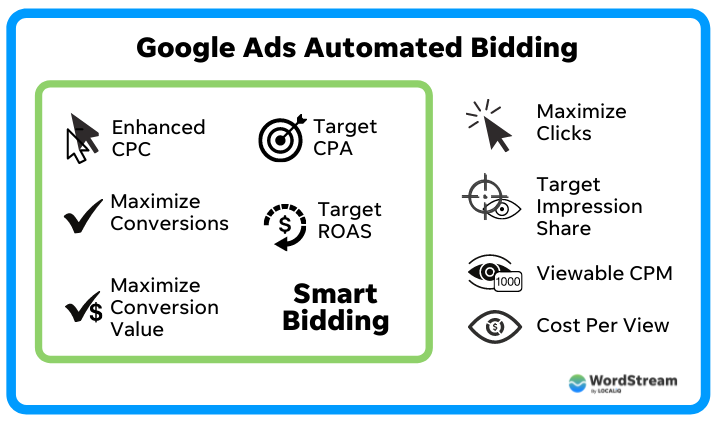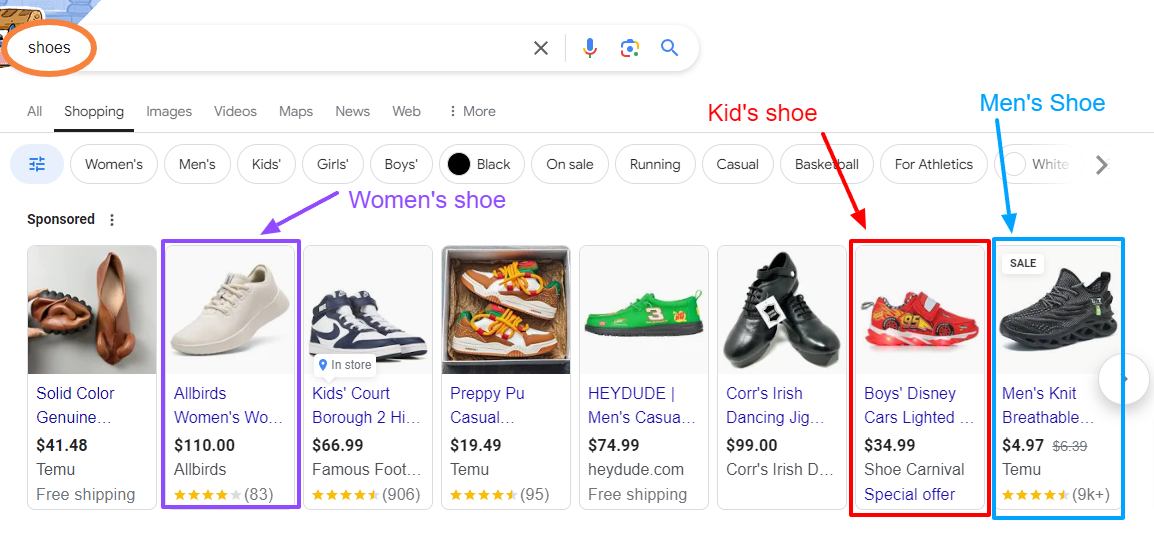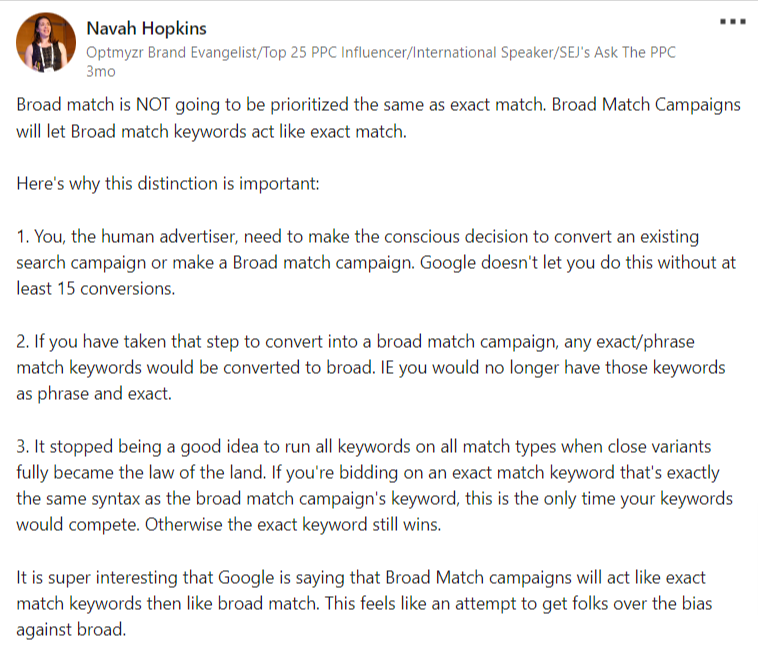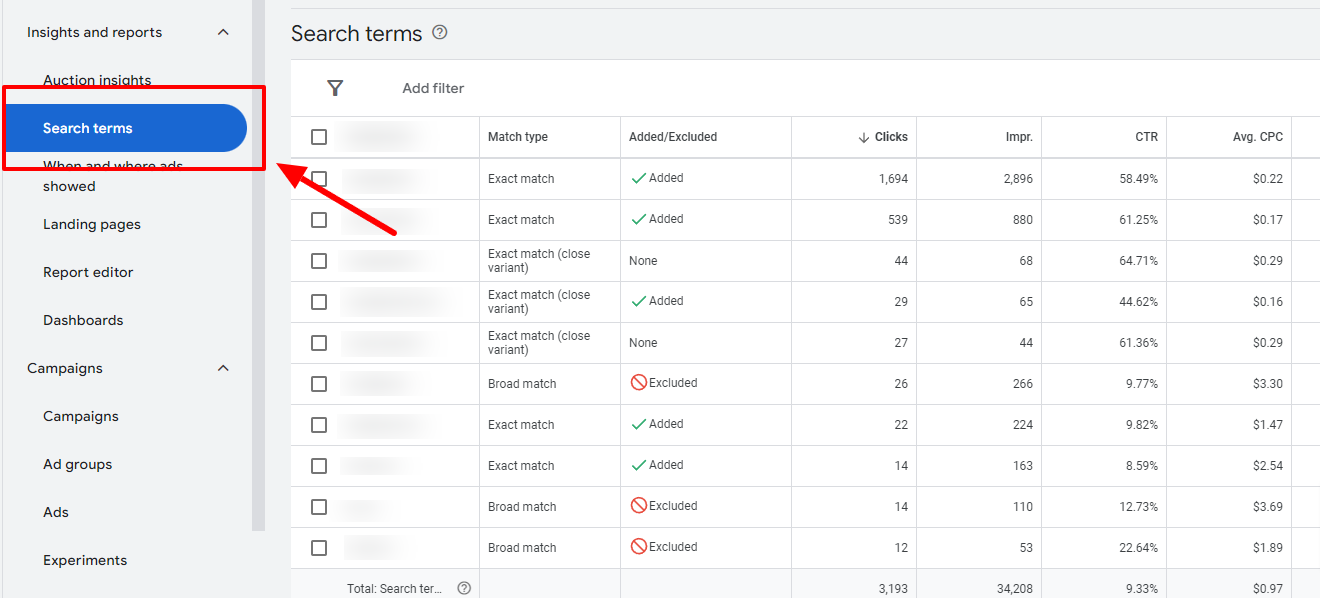Broad match keywords greatly contribute to capturing a wide range of related search queries in your ad campaigns. They help you reach a larger audience by including synonyms, misspellings, and variations of your target keywords with the ease of targeting only a few variations. However, there’s a reason they exist alongside phrase and exact match terms.
We’re here to share our perspective on the state of broad match keywords in 2024, how they currently differ from other match types, and the new ways Google is prioritizing them over other match types.
Key Highlights on Broad Match Keywords
- Broad match keywords expand your reach by connecting your ads to a wider array of search queries, including variations and synonyms, allowing for greater audience engagement. This helps ensure that your ads are shown to the right user, enhancing paid media performance and conversions.
- Broad match terms are becoming the new default match type when creating Search Ad campaigns using a Smart Bidding strategy.
- Broad match terms are starting to be treated as exact match keywords.
- Regular search term monitoring, implementation of negative keywords, and analysis of paid ad KPIs are essential for managing broad match keywords so they don’t go haywire.
Quick Rundown on How Broad Match Keywords Work
Broad match keywords are one of three types of keyword match types. Using broad match keywords within an ad group allows your ads to show up in a wide variety of search queries that might not exactly match your target phrase.
This encompasses synonyms, incorrect spellings, and differing forms of the word or phrase. The advantage here lies in gaining access to a more extensive audience by connecting with users who may not precisely input the terms you targeted.
Broad match stands out from other match types through its less stringent approach to aligning with exact terminology within searches. It’s a mechanism for your advertisements to be activated by various relevant searches, broadening potential traffic avenues compared to more narrowly focused phrases.
Here’s how broad match differs from phrase match and exact match:
Broad Match:
- Captures a wide range of search queries, including synonyms and misspellings.
- Less precise but offers greater reach and potential traffic.
- Default match type in Google Ads for search ad campaigns using smart bidding.
Phrase Match:
- Activates ads for searches containing the exact sequence of words in the specified order.
- More precise than broad match but less flexible.
- Ensures closer alignment with user intent.
Exact Match:
- Triggers ads only when the exact keyword phrase is searched.
- Highest precision and relevance.
- Limited reach but often leads to better conversion rates.
As part of its standard configuration when selecting keyword matching options, Google Ads has established broad match types as the default mode for any Search Ad campaigns using a smart bidding strategy (more on this in a bit). This means that advertisers need to be incredibly wary about how their budget is being spent. If not properly controlled by negative keyword lists, a Search Ad campaign using smart bidding can quickly attract the wrong kinds of clicks.
Key Takeaway:
Broad Match Keywords: The Pros and Cons
Using broad match terms offers a range of advantages and limitations.
The advantage lies in their ability to capture a broader spectrum of search queries than more restrictive match types, which can result in greater impressions and click-throughs. This expansive reach enhances the visibility and discoverability of your ads among prospective customers.
Nevertheless, the use of broad match keywords may lead to undesired traffic due to their less precise nature (more on that in a bit). To achieve an equilibrium between exposure and precision, integrating broad match with exact and phrase match types is the best route to follow.
Pro: Using Smart Bidding With Broad Match
Smart Bidding in Google Ads helps by using data to automatically adjust your bids so that your ads have the best chance of showing up when it really matters. During auction time, Smart Bidding algorithms assess contextual signals to determine the best bids for your ads. When combined with broad match, smart bidding ensures your ads are competitive in the most appropriate auctions for maximum impact.

Here are some of the key benefits of using smart bidding with broad match terms:
- Competitive Bidding: Smart Bidding uses historical performance data to keep your bids competitive.
- Contextual Signals: Google considers factors like user location, device type, and time of day to optimize bids.
- Relevance: Ads are more likely to be shown when they are highly relevant to the user’s current interests.
Just remember that smart bidding strategies require a minimum of 15 conversions per month to be effective.
Reallocating your advertising budget to favor broad-match keywords can enhance the efficiency and extend the reach of your campaigns while possibly reducing expenses. However, it is imperative to exercise meticulous planning and vigilant monitoring when shifting focus toward broad match keywords to ensure you are competing in the right auctions, at the right bid, for the right user.
Looking to improve your keyword strategy and optimize ad spend? Reach out to our team today to get tailored advice on how broad match keywords can work for your business!
Pro: Simplified Keyword Management
Using broad match keywords simplifies managing a long list of individual keywords while still covering a broader range of relevant search queries. By analyzing the ad group name, marketers can ensure they are targeting the right audience with appropriate bids, ultimately optimizing their campaign performance. This is a big deal when it comes to accessing variations in search queries and goes a long way in boosting click volumes. However, it’s essential to keep a close eye on things to avoid wasting money on ads appearing for off-base searches.
Advertisers who choose broad match keywords benefit from not having to maintain extensive keyword lists. This allows them to focus more on improving campaign performance. Streamlining keyword management makes for more efficient and successful advertising.
Con: Broad Match Terms Can Attract Totally Irrelevant Searches
One of the long-standing frustrations for advertisers using broad match terms is their propensity to attract totally irrelevant searches. While broad match keywords are excellent for expanding reach and capturing a wide array of search queries, they can sometimes lead to your ads being displayed for searches that have little to no relevance to your business.
This can result in wasted ad spend and lower campaign efficiency. Although implementing negative keyword lists can help mitigate this issue, it is often something advertisers have to learn after the fact. It’s challenging to anticipate every irrelevant term that a broad match keyword might trigger an ad for, making it a reactive rather than proactive strategy.
For instance, let’s say an advertiser sells running shoes and uses a broad match keyword like “shoes.” This would trigger all searches for “shoes” and might display ads for searches related to “high heels” or “dress shoes,” which may not align with the advertiser’s intent. Naturally, the advertiser would want to qualify the broad match term a bit more to what it actually sells, maybe “women’s running shoes.”

The lesson here is that you ought to be highly, highly intentional with your broad match keyword lists to prevent as many irrelevant ad serves as possible. With the way Google has been loving on broad match types in the last few years, it’s only a matter of time before broad match terms take the limelight and become the only match type available.
It’s clear that advertisers need to keep a heavy leash on their broad match terms to avoid any sort of flagrant spending on irrelevant terms.
How Broad Match Keywords Will Start Outranking Exact Match
More and more, Google has been treating even exact match terms as if they were pseudo broad match terms. What does this mean? This means that exact match keywords effectively no longer trigger ads solely for identical search queries.
Instead, they now trigger ads for close variations that carry the same intent as the original keyword. In essence, Google is now handling exact match keywords in a manner similar to broad match keywords, making it even more crucial to manage and refine your campaigns carefully.

Now, it’s not that these instances can’t still be controlled by the inclusion of a well-thought-out negative keywords list, but it’s definitely something that caught advertisers off-guard. Especially when so many were under the reasonable impression that an exact match keyword would only trigger their exact phrase.
In a recent post, Navah Hopkins commented on Google’s decision to treat broad match terms more like exact matches. Google’s intent in doing this is to give more data to campaigns based on implied user search intent. And the likely cause for all of this is so that Google has more data from account to account to inform automated strategies.

Remember, Google is still trying to win advertisers over to automated bid strategies, so it behooves them fuel every account out there with more data. And they’ll stop at nothing to do so, including treating exact match terms as if they were broad.
Key takeaway:
Best Practices for Using Broad Match Keywords
Optimizing your campaigns to achieve optimal results entails employing broad match keywords judiciously, ensuring a wide audience while preventing unnecessary clicks. Competing in the right auctions is crucial when utilizing Smart Bidding with broad match, as it ensures that bids are optimized for the appropriate user at the optimal time. Adhering to recommended methods such as integrating negative keywords, continuously reviewing and fine-tuning the campaigns, and utilizing broad match in conjunction with various other keyword match types is essential for effective balance.
1) Implementing Negative Keywords
Using broad match keywords can markedly increase the exposure of ads, yet, as we’ve already touched on, they are prone to inadvertently draw irrelevant clicks. That’s where a handy dandy negative keyword list is your saving grace.
Think of your negative keyword list as your website’s bouncer. You have an open invitation for high-intent users eager to learn about your offer, but your negative keyword list prevents poor-quality traffic from entering your site through an ad (which would burn up your budget).

Your negative keyword list is your safety net against all types of irrelevant queries triggering your ads. To that point, perhaps the single most important thing you can do for your broad match keyword campaigns is periodically assess your search terms list and add to your negative keywords list. This is currently the most effective method of regulating broad match keywords (and now even exact match terms).
2) Monitoring and Adjusting Campaigns
It’s important to regularly check and adjust your ad campaigns to make sure they’re running as efficiently as possible. Key metrics like click-through rate (CTR) show how often people are clicking on your ads, which can show how reflective they are of your audience’s intent.
Refining your campaigns in response to these metrics can enhance their impact, guaranteeing that you are targeting an appropriate audience. This constant refinement aids in preserving the relevance and optimizing the use of funds allocated for advertisements.
How to Measure the Effectiveness of Broad Match Campaigns
Continual examination of campaign outcomes is critical when utilizing broad match keywords to ensure their optimal application. Analyzing different performance metrics and the contextual signals present offers a clear understanding of the effectiveness of your campaigns and aids in making appropriate modifications.
Key Metrics to Pay Attention to With Broad Match Keywords
The following metrics are important in any ad campaign, but for broad terms in specific, the ones you’ll want to pay close attention to click-through rate (CTR), conversion rate, and cost per acquisition (CPA).
CTR gauges the frequency at which your ad is clicked in relation to how often it’s viewed, serving as a benchmark for the ad’s capacity to garner interest.
Naturally, the conversion rate gauges what proportion of those clicks result in a desired action like a sale, phone call, or form fill. Lastly, CPA shows the aggregate expense involved in gaining one customer, providing, which is helpful in deciding the value of a particular keyword or groups of keywords.
These metrics are particularly important for broad match terms because they help you understand how effectively your ads are reaching and engaging a wider, more varied audience.
Use the Search Terms Report
We touched on this earlier, but the search terms report is an essential resource for pinpointing potential negative keywords and scrutinizing the effectiveness of broad match terms. It provides insight into which specific search queries have activated your advertisements, thereby helping you decide which terms to bid on, and which to throw into the bin.

It is critical to monitor and enhance the performance of broad match keywords to ensure that campaign effectiveness reaches its peak.
Final Thoughts on The Future of Broad Match Terms
Broad match keywords are still plenty useful in their own right, but the fog is slowly clearing on Google’s larger intent. With how much Google is building up broad match keywords as the standard, it means advertisers will need to be even more vigilant than usual. Smart bidding can help alleviate some of that headache, but it tends to leave advertisers further in the dark as to how Google is handling their budgets.
We’d love to think it will only get better, but that’s not exactly the forecast we see coming. In the meantime, advertisers on Google should re-align their expectations for how to get results from Google Ads, focusing on ways to regulate and optimize their broad match terms.
Fret not, though. PPC advertising might be getting trickier as we navigate around Google’s whims, but it can still be hugely effective for brands with a killer online offer.
How will you use broad match terms in your ad campaigns? We’d love to hear!
If you’re ready to start optimizing your broad match keywords, Single Grain’s paid media experts can help!👇
Recommended Video
For more insights and lessons about marketing, check out our Marketing School podcast on YouTube.
Frequently Asked Questions
-
What are broad match keywords?
Broad match keywords help your ads show up for a variety of related searches, including synonyms and even misspellings, making it easier to reach a larger audience.
It’s a great way to increase visibility!
-
How do broad match keywords differ from exact match keywords?
Broad match keywords help you reach a wider audience by capturing a variety of search queries, while exact match keywords target specific terms for higher relevancy and better conversion rates.
So, if you want more visibility, go broad; if you crave precision, stick to exact matches.
-
What are the benefits of using smart bidding with broad match?
Using smart bidding with broad match can significantly improve your ad performance by leveraging machine learning to optimize bids based on real-time data and contextual signals. This means you’ll reach a wider audience effectively without sacrificing control over your budget.
-
Why are negative keywords important in broad match campaigns?
In broad match campaigns, the use of negative keywords is essential to ensure that your ads are displayed to appropriate audiences by filtering out unrelated viewers, thus improving the campaign’s effectiveness and targeting accuracy.
-
What metrics should I track to measure the effectiveness of broad match campaigns?
To measure the effectiveness of your broad match campaigns, focus on tracking click-through rate (CTR), conversion rate, and cost per acquisition (CPA).
These metrics will give you a clear view of how well your campaigns are performing and where to optimize.






